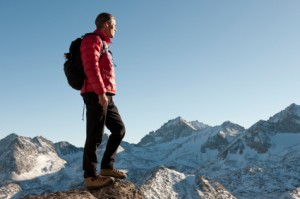 One of my patients recently moved from his sea level home here in Florida to the desert mountain city of Santa Fe. He called me shortly after he moved—he hadn’t found a new doctor yet—reporting that he felt awful. He was tired all the time and grew short of breath easily.
One of my patients recently moved from his sea level home here in Florida to the desert mountain city of Santa Fe. He called me shortly after he moved—he hadn’t found a new doctor yet—reporting that he felt awful. He was tired all the time and grew short of breath easily.
I realized at once that he was being affected by the altitude gain. He’d moved from sea level up more than 5000 feet and the thinner air was taking its toll.
In his situation, he can wait it out. In about six months, his body will have adjusted and he’ll feel normal again. He’ll even have benefited from the change. His lung capacity will increase because of the thinner air.
People who enjoy high altitude sports like mountain climbing don’t have the luxury of adjusting to thin air over time. Mountain climbing can be an exhilarating, inspiring experience. But not if you are dizzy, tired and achy because of the lower oxygen content in the air.
Whether you are moving to a higher elevation, planning to try mountain climbing or another high altitude sport, there’s an herbal remedy that you should know about. It can help make your moving transition easier or your sporting experience more enjoyable.
The Best Way to Combat Altitude Sickness
One option is to take a common drug Diamox to prevent altitude sickness. Like all drugs, Diamox comes with potential side effects. It can make you feel sleepy, thirsty, or flushed. As you know I’m not fond of putting my patients on drugs so I rather you tried other alternatives to handle any of your altitude discomforts.
Thankfully, there’s a better option. You’ve heard of ginkgo biloba. Its beneficial affects on memory have made it a star among herbal supplements. One of its less touted benefits is that it can virtually eliminate the affects of altitude sickness.
In one study, people were given either ginkgo biloba or a placebo one day before making a rapid ascent up Mauna Kea, a mountain in Hawaii. Sixty-four percent of the placebo group suffered severe altitude sickness versus only 17 percent for the group taking ginkgo.[i] That’s quite a difference.
Ginkgo works in your system to actually enhance your circulation. That means more blood gets to your brain and to your extremities. More blood means more oxygen, which is how ginkgo helps to alleviate the affects of thinner air.
The best way to protect yourself from altitude sickness is to begin taking 60 mg of ginkgo each day at least five days before your ascent. Studies show its effective just one day before, but five days provides even better results. I recommend using a ginkgo extract rather than a capsule—generally liquids absorb into your body better.
By planning ahead you can eliminate days of misery and perhaps even save a trip that would have been cut short by altitude sickness.
Stay well,
Mark Rosenberg, M.D.
[i] Gertsch JH, et al. “Ginkgo biloba for the Prevention of Severe Acute Mountain Sickness (AMS) Starting One Day before Rapid Ascent,” High Alt Med & Biol 2003; 3(1): 29-37
Photo Credit: naturalathleteclinic.com
